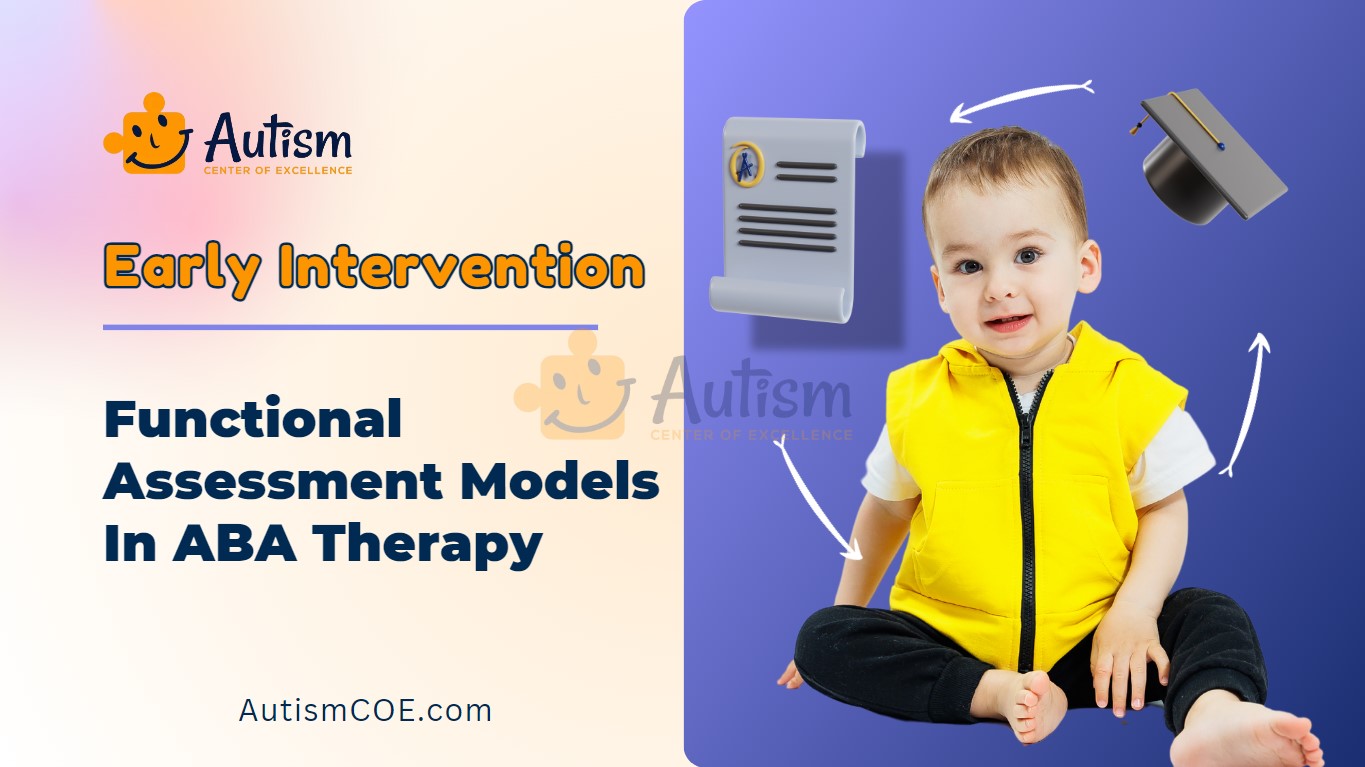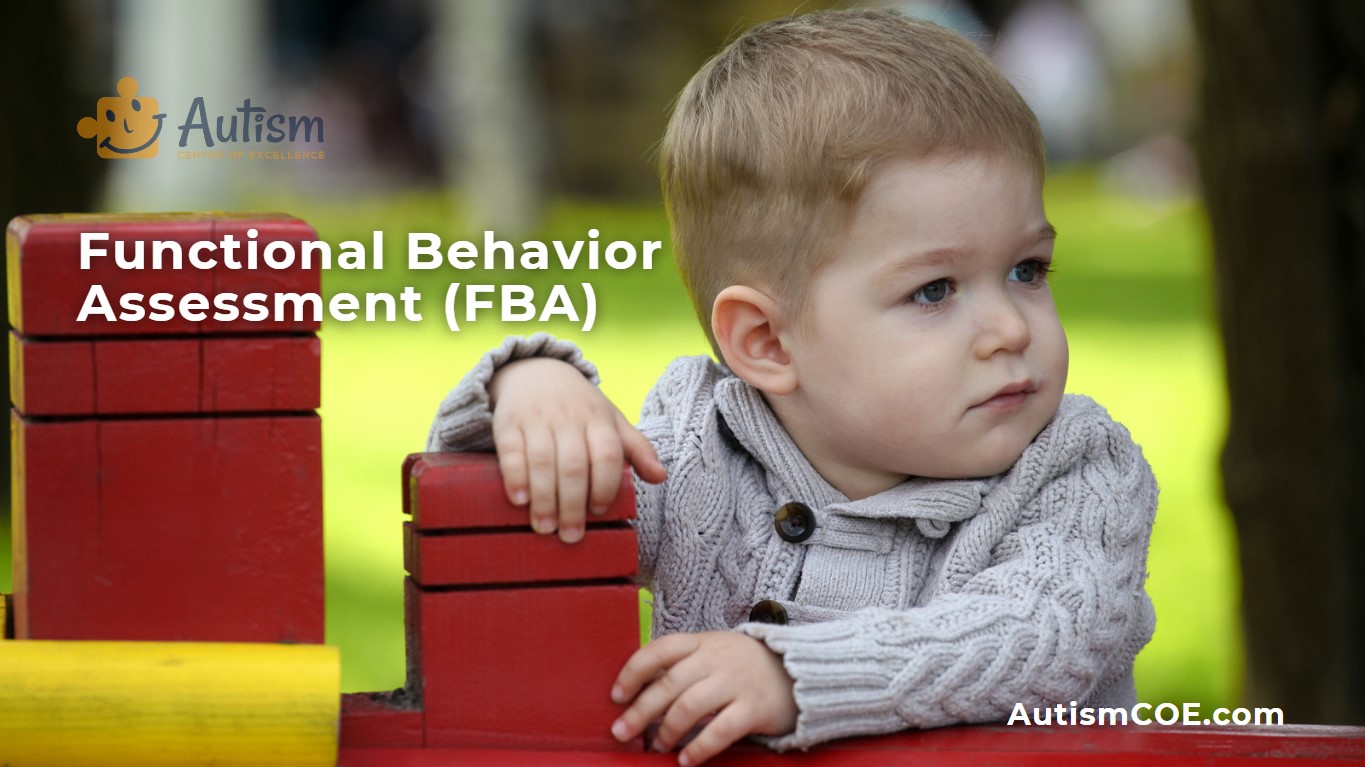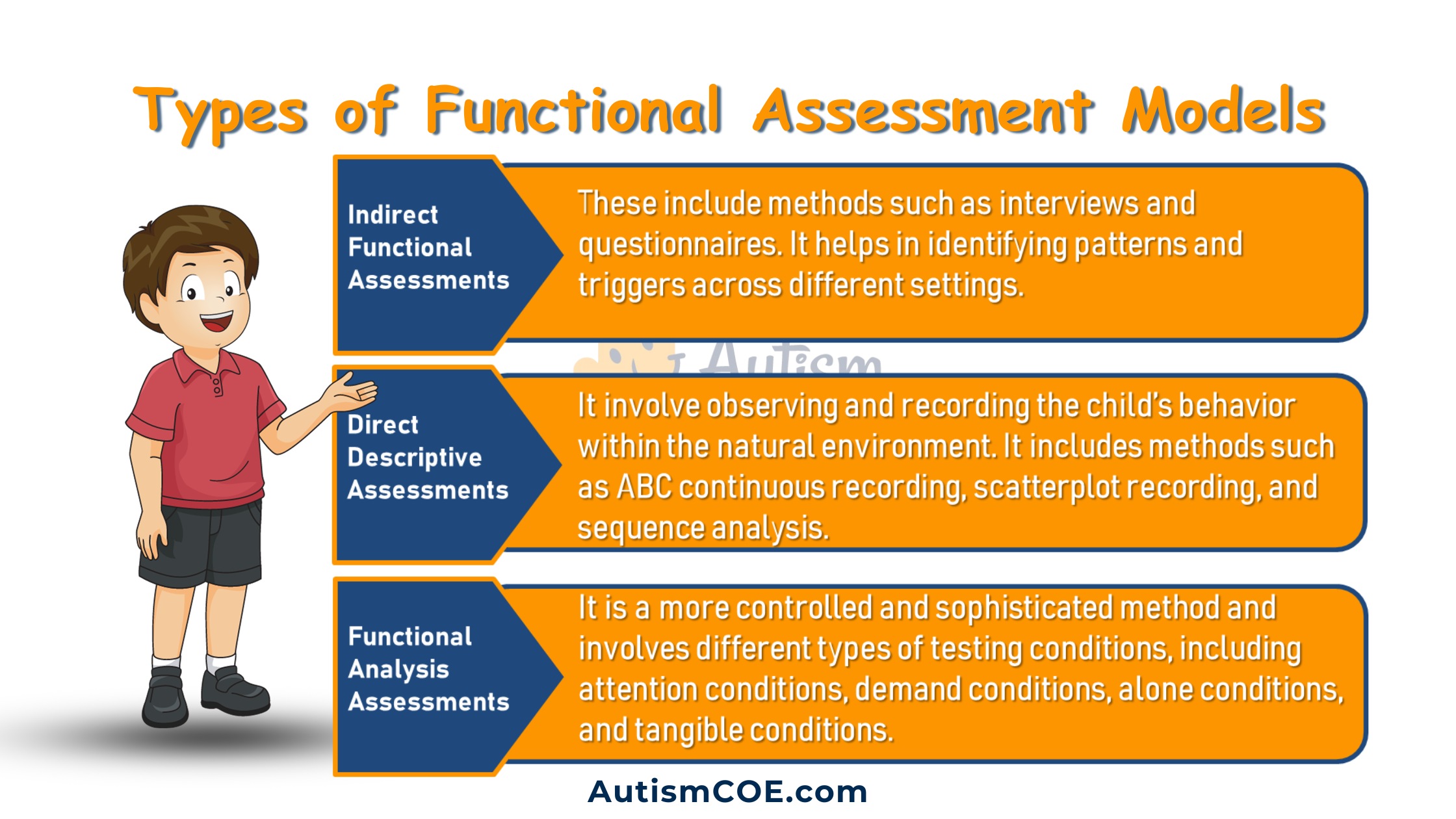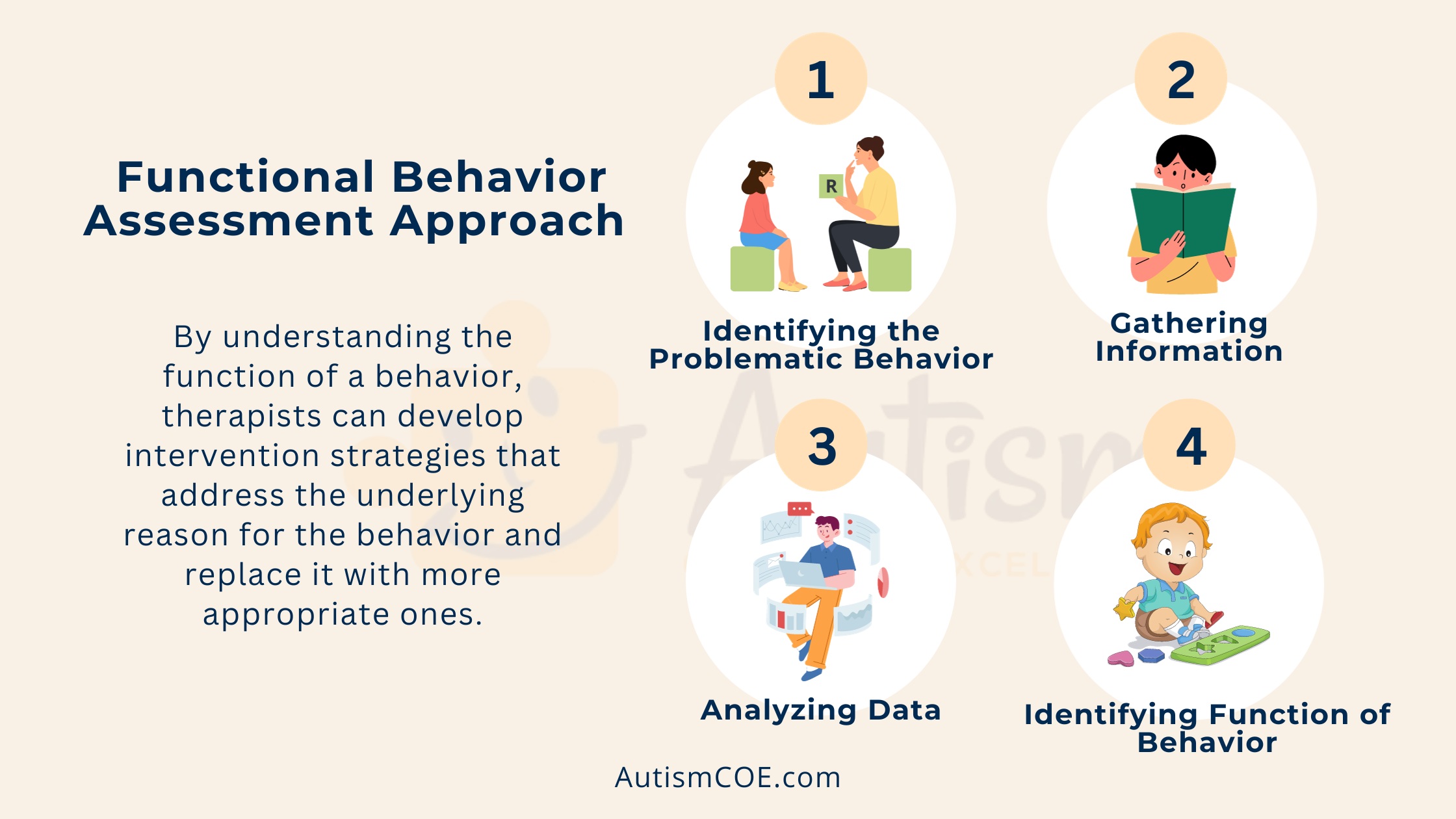Unit 12: Functional Assessment Models in ABA Therapy for Early Intervention

Applied Behavior Analysis (ABA) therapy stands out as the critical part of Early Intervention for kids with developmental disorders. It helps to reinforce social responsiveness, obtain and use new skills and decrease the number of functional deficits. This treatment terminantly abrogates the FOW program that deals with function evaluators in determining individualized strategies. This makes the medication more appropriate especially to the targeted problems. This article embodies various models for the early intervention applied in ABA Therapy and how it can be used to support the children’s behavior.
What is Functional Assessment in ABA Therapy?
Functional assessment is a systematic procedure in ABA Therapy used to address the ‘why’ aspects of how behaviors are followed. It is carried out by many techniques including observations, questionneires and data analysis either one-to-one or groups to see a child’s behavior in a context. It is the most important way toward singling out of the special things that result in correlations between causes and effects. A positive environment creates the basis for developing Individual Behavior Intervention Plans that are centered on the elimination of problem behavior and only not the symptoms of it.
The Purpose of Functional Assessment Models
Functional assessment approach helps in determining the underpinning issues that lie behind the troubling behaviors of a child. The central motion in the mechanisms of instigating beliefs is to examine such aspects as the reason or the meaning of the behavior instead of just the form. This method back up the PTs of Autism to generate efficient and proactive approaches targeting the root cause of the problem..

Functional Behavior Assessment (FBA)
Functional Behavior Assessment (FBA) is a functional assessment model confronted by ABA therapy at a high level. Rather, this framework entails exploring the underlying factors and the consequences of the behavior at hand. Without a doubt, this would be one of the most crucial roles played by psychosocial therapy by making available to therapists such determinants as proximal environmental factors and intangible motivations for both the inception of and sustainment of this behavior. It comprises a data collection process through direct observation, recording situational and experiential factors of behavior that act as antecedents to the occurrence of behavior. Following that, the physical and social consequences are analyzed.
FBA will help form efficient interventions and address every student’s needs. By researching specific factors of a child’s behavior, therapists can identify and know the most powerful ways to replace harmful behaviors with new skills using environment modification. Such methods may involve changing the antecedents to ensure that the negative behavior is not recurrent or adjusting the consequences to counteract the existing conditions of the intended behavior. This method was tested regarding the above-mentioned Children with Developmental Disorders, like autism, and showed high success in reaching their behavioral goals.
Join Our Weekly Newsletters!
Subscribe now to stay updated with our latest email updates.

Types of Functional Assessment Models
There are three main types of functional assessment models used in ABA therapy:
1. Indirect Functional Assessments
Functional assessments, which is the indirect evaluation of a child’s capabilities and supports, plays a crucial role in ABA therapy. These may be achieved through, among others, methods like surveys and questionnaires. Such mediators can help in finding out the real reason behind the behavior of a child because the children may show different kind of behavior in front of their parents, friends and teachers. It is also necessary for finding common denominators and causes across varied settings, leading to the development of a Comprehensive Intervention Plan. which is the most effective method
2. Direct Descriptive Assessments
Child behavior out in the world is observed and written down unpretentious (no need for complex) description. It includes techniques like ABC non-stop ticking, graph recording also called spectrum plotting, and aftertaste pattern gathering.
Using both of these direct evaluations, therapists can get a complete picture of the child’s behavior. Consequently, they can formulate more efficient intervention strategies especially since they will have gathered a lot of information from previously administered tests. All those methodological types are very beneficial and give a wide spectrum of views on behaviors. These types of methods can be used separately or integrated with other methods.
ABC Assessment
The ABC Assessment is one among several specific observation instruments that are utilized by ABA therapy.It stands for Antecedent-Behavior-Consequence. This appraisal empowers a therapist to understand the context present in which a behavior takes place as well as the behavior, and the consequences that it leads to. For instance, when a child temperamentally (behavior labelling) denies a toy (antecedent event), and then the toy (consequence) is given, the ABC assessment can be influenced by either switching the consequence event or the antecedent event to combat the behavior observed.
3. Functional Analysis Assessments
Functional Analysis Assessments are a method employed for determining the function of a particular behavior by manipulating environmental conditions. It is the most if not the most complex, technically, and may incorporate a variety of testing situations, like attention condition, demand condition, alone condition and tangible condition. Practitioners are able to isoolate and then control the given environmental variable, in order to learn the function of the behavior and then develop the treatment impacting it.

Steps Involved in Functional Assessment
The Functional Behavior Assessment (FBA) is a complex process that enables an in-depth comprehension of rooted behaviors. It involves the following stages:It involves the following stages:
Identifying the Problematic Behavior
The primary step while applying the FBA is to delineate the problematic behavior with a specific statement. This consists of notifying when, where and how often it takes place, secondly, they should determine the frequency or severity of such behavior. It will be important to articulate what you observed using the attributes that are trackable and measurable.
Gathering Information
In the next phase, the analyst needs to record the behavior observed. This can be done through taking direct faces with caregivers teachers, and by viewing on the records and data.
Analyzing Data
The next step is when an adequate amount of data has been clustered, it is analyzed to form patterns and find the triggers that may have brought about the behavior.
Identifying Function of Behavior
Lastly, the FBA determines in order to substantially utilize this behavior the child needs to understand the purpose of the behavior. These could be the case like attention-seeking, simply trying to avoid something, obtaining a liked item or activity, or self-punishment.
Moreover, therapy and intervention are tangled because therapists can develop appropriate strategies that attack the very essence of a behavior and replace it with similar ones.
Benefits of Functional Assessment
Functional and behavioral assessments offer several advantages that facilitate improving the conditions and the quality of life.
✅ Comprehensive Understanding
Through this approach, they can provide a complete picture of why the child acts certain way, they find the source of these problems not only the surface symptoms.
✅ Individualized Treatment Plans
Functinal assessments helps therapists to identify the special patterns and triggers of each child and thus provide highly individualized treatment plans.
✅ Efficiency
The deeper the insight is given into the function of behavior, the more precisely therapist can craft the treatment plan. This can result in a more gradual and efficient progress of the therapy.
✅ Data-driven Decisions
Performing functional assessments for the therapists would give them the data of the patient to formulate the strategies for the treatment management based on it.
✅ Increase the standard of life living
Implementing the positive one and diminishing negatives by consistent behavior functional assessment will hugely benefited the lives of children and their families.
Challenges of Functional Assessment
Despite these significant benefits, functional assessments do present some challenges:
🌟 Time-Consuming
Effective baselining often may consume much time which otherwise can be utilized in involved the direct intervention.
🌟 Requires Expertise
Advising action plans of a functional assessment the specialist should have high professional qualities which can be complicated.
🌟 Environmental Factors
Functional assessments are the consequence of the interaction with the environment, this invisible axis can sometimes confuse whether the same behavior will recur in other circumstances.
🌟 Resistance to Change
Some practices which are developed in order to fulfill a purpose for a child may remain stable in spite of the fact that the very purpose has inherited a change.
🌟 Ethics
In many cases it will result in some ethical doubtfulness ethical issues regarding most such tests are that the welfarist has to encourage or even provoke patient’s troublesome actions only to be able to observe possible triggers and consequences.
The Future of Functional Assessment in ABA Therapy
Technology and research are of course progressing, therefore, functional techniques are becoming more and more adaptive. In addition to that, innovative techniques might deal with the use of digital tools for data gathering and analysis, along with the theories that target on the support of good behavior. These changes promise to bring hot prospects about using ABA Therapy as a method of Early Intervention in the future.
It is the ABA therapy and functional assessment models that fill an important slot of the pot of the early intervention for children with developmental disorders. Indeed one can say that by means of explaining and deconstructing behavioral patterns and triggers we make the way for achievement of new advanced and personalized therapy methods.
Frequently Asked Questions & Answer
Why is Functional Assessment Important in ABA?
While it is absolutely imperative for applied behavior analysis (ABA) to perform a functional assessment due to its role as a nexus between a person and their environment and behavior. This knowledge provides practitioners with the ability to design measures and programs that bring better results in diminishing disruptive behaviors and in addition to incorporation of socially-appropriate ones. It brings a new perspective to the otherwise subjective notions and generalizations about the causes of certain behaviors, which is essential for precise treatment.
Who Can Conduct a Functional Behavior Assessment?
A FBA which is conducted by practitioners experienced in, and trained into behavior analysis. One of the key highlights of the treatment is the intervention, which generally includes Board Certified Behavior Analysts (BCBAs), psychologists, and special education teachers. Though that, it must be mentioned, case-related qualifications may differ according to the local regulations and the level of complexity of a case.
What Does Functional Assessment Seek?
Functional assessment seeks to identify the purpose or function of an individual’s behavior. It tries to understand why an individual behaves in a certain way by looking at what happens before (antecedents) and after (consequences) the behavior occurs. The goal is to understand the environmental factors influencing the behavior, which could include social attention, obtaining a tangible item or sensory stimulation, or escaping or avoiding a situation or task.
When Should a Functional Assessment be Done?
Conducting functional assessment is critical as a part of the treatment journey if a person’s behavior starts to interfere with the surrounding people or the environment. This could involve harmful behaviors toward themselves or others, or social context as well as learning skills So an FBA is additionally demanded when the strategies, that were used before, have proven to be ineffective in changing the behavior.
Conclusion
Functional assessment models working with Early Intervention principles which are the Autosm Center of Excellence’s bedrock. The coping skills are helpful whenever one needs to get through the most noticed and painful of the behaviors, by being sure of the triggers and patterns. There are indeed some difficulties, but they provide important means to the end improving educational experience and help children living with developmental challenges grow and have their issues dealt with competently. AutismCOE regards these as an integral element of ABA Therapy, and success during early intervention Generally, because therapists of the Autism Center of Excellence know the functional assessment models and their role in ABA therapy, they can give every child with developmental disorders the highest grade of supported and consequently help them to be able to develop their skills to the maximum.
Please Note: The content of this blog is for informational purposes only and should not be considered a substitute for professional medical advice, diagnosis, or treatment. Consult a qualified healthcare professional for personalized guidance tailored to your specific situation.

Bhavika Bhasin
Bhavika Bhasin is the Research and Marketing officer at AutismCOE. She works with children and adults with ASD. Her clinical research includes evaluating various available autism screening and diagnosis methods and their efficacy. She is currently developing a novel screening exam that is indicated to be more accurate than the existing available exams. She is also writes articles papers for various publications.

